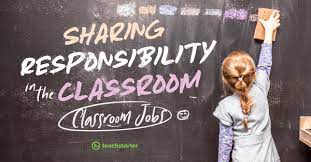Responsibility is a core value that is essential for the success and growth of students. In the classroom, teaching this value can be incorporated through the implementation of classroom jobs. By sharing responsibilities, students not only learn about what it means to be accountable but also about working as a team and contributing to their community.
Classroom jobs vary from simple tasks such as organizing materials and cleaning up after activities to more complex roles like helping with technology or leading reading groups. These roles give students a sense of ownership and pride in their environment. Moreover, they learn life skills like time management, collaboration, and leadership.
The key to implementing classroom jobs is consistency and rotation. By rotating jobs regularly, students get exposed to different roles, understand various aspects of maintaining a classroom, and become well-rounded in their abilities to contribute.
In conclusion, sharing responsibility through classroom jobs is not merely about keeping the classroom tidy or organized. It is a crucial element in fostering accountability, teamwork, empathy, and self-reliance among students—skills that they take with them beyond the school walls into their future careers and personal lives. Classroom jobs are thus a stepping stone to nurturing responsible and active citizens in society.





